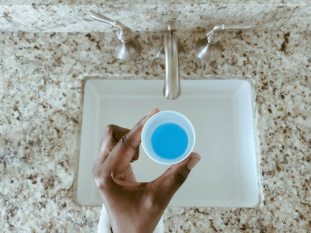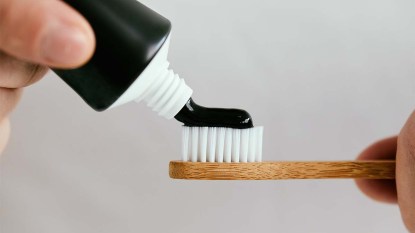Dentists Say These 6 Tips Help Stop Bleeding Gums Naturally
Plus find out the key ingredients you should look for in toothpaste

You know that brushing and flossing your teeth daily is essential for good oral health. It keeps your breath fresh, reduces your risk of cavities and ensures your smile stays bright. But if you brush too hard or use the wrong equipment (more on that below), you might experience an unintended side effect: bleeding gums. Everyone’s gums bleed occasionally, but if it happens often, it could indicate gum disease. If you’re wondering how to stop bleeding gums, the good news is that a few small changes can make all the difference. Here, experts explain how to stop bleeding gums and easy tricks that keep your gums healthy.
What causes bleeding gums?
Simply put, “gums bleed because they’re inflamed,” says Leena Palomo, DDS, MSD, a board-certified periodontist and professor and chair of The Arthur Ashman Department of Periodontology and Implant Dentistry at the NYU College of Dentistry. “Like any inflammation — be it a sunburn or a fever — the area gets hot and swollen.”
Gum inflammation occurs for various reasons, but the most common cause is gum disease, of which there are two types:
1. Gingivitis
Gingivitis is a mild form of gum disease. It occurs when plaque (a film of food, saliva and bacteria) sticks to your teeth and builds up along your gum line. “This makes the gums red, swollen and more likely to bleed,” says Nicole Mackie, DDS, MS, FACP, founder of the Dr. Nicole Mackie Dental Implant Specialty Center in Las Vegas.
2. Periodontitis
Periodontitis occurs when gingivitis goes untreated. Without regular dental care, plaque can harden and turn into a deposit called tartar. Dr. Mackie says that tartar tends to accumulate beneath your gum line, irritating your gums more and making them bleed worse.
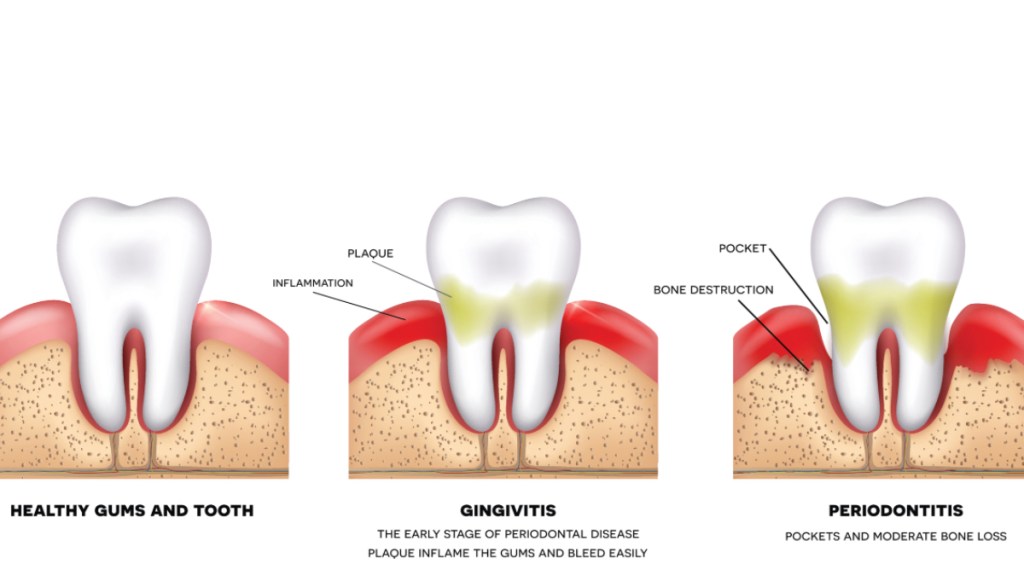
Fatima Khan, DMD, a Houston-based dentist, says other things can also cause bleeding gums, too, including:
- Vitamin deficiencies, such as a shortfall of vitamins C or K
- Hormonal changes associated with pregnancy, menstruation and/or menopause
- Stress
- Certain prescription drugs, such as blood thinners
- Liver disease
- Pernicious anemia
- Diabetes
Another sneaky cause of bleeding gums: Your at-home oral hygiene routine. If you’re using a toothbrush with stiff bristles or brush your teeth too vigorously, your gums may become irritated and bleed.
Related: These Easy, Surprising Self-Care Tips Can Reverse Gum Disease, Say Dentists
Side effects of untreated bleeding gums
“Anyone who doesn’t brush and floss regularly and see their dental hygienist for regular cleaning is susceptible to bleeding gums,” says Alex Mehler, DMD, an endodontist and the vice president of endodontic support services at Aspen Dental. “If gum inflammation goes untreated, periodontal disease is on the horizon.”
Without treatment, Dr. Mehler says gum disease can cause gum recession, bone loss and ultimately, tooth loss. “Receding gums also increase the risk of dental caries or cavities,” he adds — another reason not to ignore bleeding gums.
Related: Dentists Reveal How to Get Rid of Canker Sores Fast + What Remedies Actually Make Them Worse
The best toothpaste for bleeding gums
Reversing the root cause of bleeding gums, such as gum disease, takes time. But using a gum-friendly toothpaste can ease inflammation in the interim. Kristy Gretzula, DDS, an NYU-trained dentist who owns and operates Hawley Lane Dental in Stratford, Connecticut, says that when patients ask her about bleeding gums, she recommends toothpaste that contains one or more of the following ingredients:
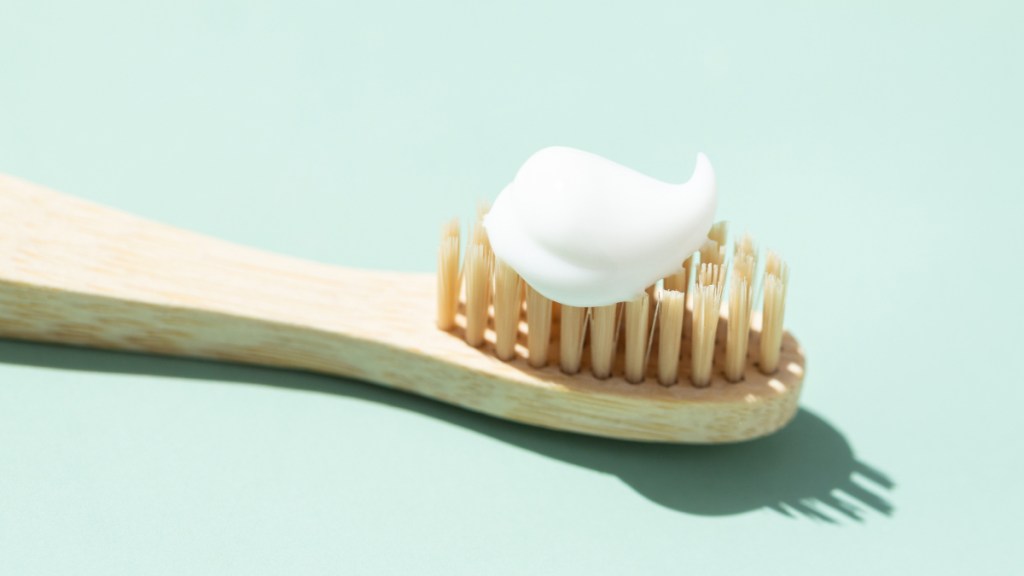
1. Stannous fluoride
“This compound helps prevent tooth decay, but also has antibacterial properties,” Dr. Gretzula explains. “It can inhibit the growth of bacteria that contribute to gum disease.”
In fact, a study in the Journal of Periodontology found that toothpaste containing stannous fluoride significantly improved plaque levels and signs of gingival inflammation and bleeding by eliminating harmful oral bacteria.
2. Triclosan
Triclosan is an antibacterial agent similar to stannous fluoride. “It can help reduce the bacteria in your mouth and gum inflammation,” Dr. Gretzula says. Research proves it’s true: A Cochrane Database Systematic Review found that folks who used triclosan toothpaste experienced less plaque and gingivitis, plus saw a 48% reduction in bleeding gums.
3. Essential oils
Many toothpastes contain essential oils that freshen breath and ward off harmful oral bacteria. Dr. Gretzula says two in particular are especially beneficial: tea tree oil and eucalyptus oil. (Click through to see more eucalyptus oil benefits.)
A study in Pharmacy found that eucalyptus oil reduces plaque buildup and helps eliminate the bacteria responsible for gum disease. Similarly, a separate study showed that tea tree oil reduces gum inflammation and promotes gum healing.
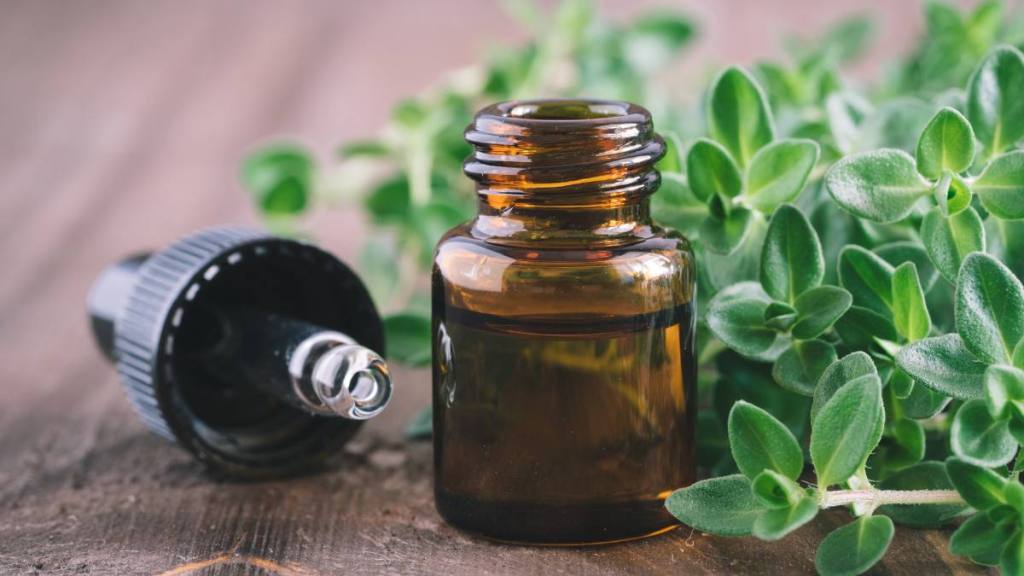
4. Sodium bicarbonate
Another ingredient worth looking for? Sodium bicarbonate, aka baking soda. “Baking soda is mildly abrasive, helping remove plaque and surface stains from the teeth,” Dr. Gretzula says. “It can also neutralize acid in the mouth and has been used in toothpaste formulations for its potential benefits for gum health.”
Our experts’ top toothpaste pick for bleeding gums
Dr. Khan says she regularly recommends Parodontax toothpaste to patients with bleeding gums. “They’ve done studies to show it reduces plaque and bleeding gums if used twice a day,” she says. “And most people experience significant results within 12 weeks.”
Dr. Mackie agrees, adding that “Parodontax helps with bleeding gums by removing plaque buildup below the gumline”
How to stop bleeding gums with home remedies
Using the right toothpaste is a smart way to reduce plaque build-up. But it’s not the only way to stop bleeding gums. Here are are six more smart strategies that can make a big difference.
1. Brush this way
If you have tender or bleeding gums, it can be tempted to brush or floss less often to avoid triggering pain. “But that exacerbates the issue,” Dr. Khan says. “Continue to brush twice a day and floss daily.”
And how you brush your teeth is just as important. “Sometimes, we can traumatize our gums with excessive brushing,” says Irina Kessler, DDS, an NYU-trained dentist and the owner of New York Family Dental Arts. “Usually, that kind of inflammation goes away within a few days.” Still, vigorously running your toothbrush back and forth only worsens gum bleeding. A better bet? Using a soft-bristled toothbrush and brushing in gentle, circular motions.
Tip: Consider swapping your manual toothbrush for an electric one. Research suggests that these toothbrushes eliminate plaque better and reduce the risk of bleeding gums compared to manual toothbrushes.
Related: Your Toothbrush Is Teeming With Bacteria: Dentists Share How to Clean It
2. Consider a floss swap
Flossing your teeth can be challenging if have arthritis that affects your hand and finger mobility or dental devices such as a bridge that makes it difficult to get into every nook and cranny. Luckily, there are workarounds that make flossing easier. Dr. Mehler says items like floss threaders, floss picks and proxabrushes can “get under, around and into hard to reach places to keep the spaces between your teeth clean and your gums healthy.”
An electric flosser can make flossing easier, too, by vibrating between teeth to loosen trapped food debris. (Click through to see more brilliant uses for dental floss beyond cleaning your teeth.) New to some of these methods? Check out the video below for a visual how-to guide for using a floss threader:
3. Swish with saltwater
When it comes to the question of how to stop bleeding gums, a saltwater rinse can provide prompt relief since “salt has natural disinfectant properties,” Dr. Mackie says. She suggests mixing 1 tsp. of salt into 1 cup of warm water. Stir until the salt dissolves, then swish it around your mouth for 15 to 30 seconds. Spit out the saltwater and repeat the same steps two or three times. According to Dr. Mackie, this helps reduce inflammation and defend against gum-aggravating bacteria.
Several studies have confirmed saltwater’s gum-supporting benefits. One in Evidence-Based Dentistry found that saltwater rinses reduced inflammation after gum surgery. This led researchers to conclude that a saltwater rinse is an affordable, easy treatment for gum inflammation and gum disease. Tip: Too much salt can actually irritate your gums — less is more. (Click through to see more benefits of gargling salt water.)
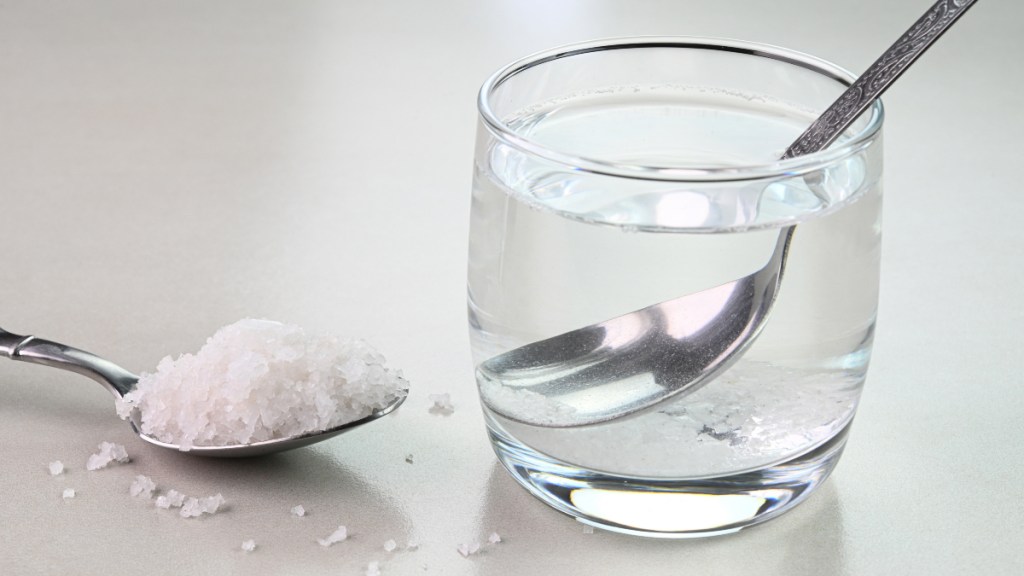
4. Make a turmeric paste
Turmeric is a bright yellow spice frequently used in South Asian cooking. It has a sweet, slightly peppery flavor that’s essential to dishes like Indian curries. But that’s not all. Dr. Mackie says it also has natural antibacterial and anti-inflammatory properties.
These healing powers are particularly beneficial for bleeding gums. A review in Complementary Therapies in Clinical Practice found that turmeric was as effective at treating gum disease as chlorhexidine, a common mouthwash ingredient. The scientists found that turmeric reduced the amount of harmful plaque in the mouth and eased inflammation.
Another study in the Journal of Natural Science, Biology, and Medicine looked at the use of turmeric paste on bleeding gums. In that study, folks applied a paste made of 1 tsp. of turmeric, ½ tsp. of salt and ½ tsp. of mustard oil to their teeth and gums twice daily. After 21 days, researchers found that the turmeric paste was just as effective at treating gum problems (like bleeding and inflammation) as chlorhexidine mouthwash. The turmeric paste also helped eliminate harmful oral bacteria. (Extra turmeric leftover after tending to your gums? Click through to see how turmeric speeds weight loss).
5. Try oil pulling
Folks in India have practiced oil pulling for thousands of years. It involves rinsing your mouth with plant-based oil (like sesame oil or coconut oil) to brighten your smile, freshen your breath and ward off bacteria.
“Most people use coconut oil due to its antibacterial properties,” Dr. Mackie says. To get started, measure out 1 Tbs. of coconut oil and put it in your mouth. “Swish the oil for 15 to 20 minutes to get the full soothing effect.” After, spit the oil into the trash and rinse your mouth with water.
Oil pulling provides benefits similar to saltwater rinses and turmeric paste. A review in the International Journal of Dental Hygiene found that oil pulling provided similar gum health benefits to rinsing with chlorhexidine mouthwash. Plus it reduces plaque buildup, a top cause of bleeding gums.
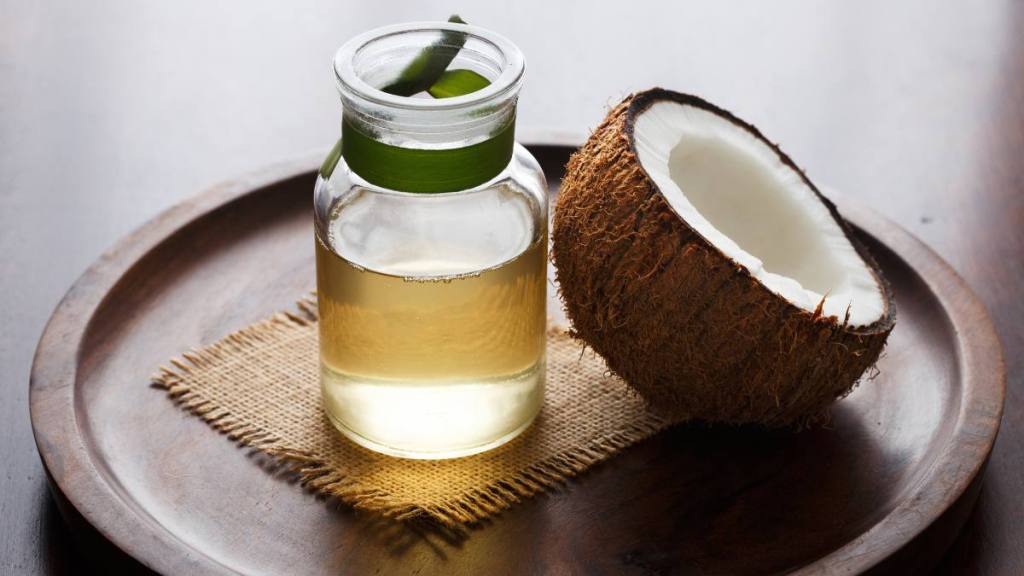
6. Rinse with green tea
Green tea is loaded with antioxidants. So it’s no surprise that “green tea has anti-inflammatory properties that benefit oral health,” says Dr. Gretzula. “It may help reduce inflammation and fight bacteria.” Indeed, a study in the Dentistry Journal found that green tea mouthwash significantly reduced plaque and gingivitis.
For those who want to know how to use the cuppa to stop bleeding gums, Dr. Gretzula recommends brewing a cup of green tea and allowing it to cool. Then, rinse your mouth with the cooled tea for 30 seconds to 1 minute. Spit it out and repeat as needed. (Click through to learn why green tea is one of the best teas for a sore throat, too.)
When to see a dentist for bleeding gums
Preventive dentistry is essential for healthy teeth and gums, especially for folks wondering how to stop bleeding gums. “You should see your dentist on a routine basis for hygiene appointments,” says Daniel Rubinshtein, DDS, a New York City-based dentist. “This way, you build a rapport with your dental team and have a standard on how your gums are supposed to feel.” These checkups can even identify underlying problems, such as misaligned teeth and crowding, that make maintaining good oral health more difficult, Dr. Mehler adds.
“While short-term relief of bleeding gums is important, treating the root cause is even more so,” Dr. Palomo says. “Without diagnosing and treating oral inflammation, conditions such as gingivitis can progress.”

For more ways to improve your oral health:
These Easy, Surprising Self-Care Tips Can Reverse Gum Disease, Say Dentists
Your Toothbrush Is Teeming With Bacteria: Dentists Share How to Clean It
This content is not a substitute for professional medical advice or diagnosis. Always consult your physician before pursuing any treatment plan.






